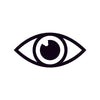WHAT IS THE 'LONG-ARM SYNDROME'?
Introduction
I often have a question from my patients about “why am I not able to read at near anymore?”. While the patients try to read small prints such as the label on the bottles or boxes of the medicine or the telephone directory, they often find that they have to push the things away to see it clearly or/and good bright lighting is always required to read properly again. However, things can become difficult to be seen (like looking at your cell phone screen) or handled (like threading a needle) at a far distance even if you have a better focus with your stretching long-arm (hold things further away). This is a condition called presbyopia (unable to focus on near objects), which happens on every single one after the age of 40, and Indeed, no one can ever escape from it.
Mechanism
Another question from the presbyopic patients will often ask “why am I having it?”. I usually explain to the patients that our eyeballs are just like a camera, which composes of a focusing lens and a film (retina). In order to have a sharp clear picture of objects at far or near from the camera, the focusing lens inside the camera needs to adjust its focal power accordingly so the captured image of objects can be focused properly on the film (our retina). This process is usually finished within seconds by all digital cameras.
Likewise, our eyeballs share the same principles as the digital cameras. However, human lens becomes less and less elastic with age, which plays an important role in providing enough focal power to see an object at a short distance. In brief, we need “more power” to see a “closer” object.
Unfortunately, the amount of “power loss” due to the lens hardening becomes significant after the age of 40, and the maximum achievable power also becomes less gradually with age. Presbyopic patients often reported that they need to pay more effort and it takes longer time to focus properly at near. They often feel that their near vision is usually better in the morning or worse when they are tired after a long day of work.
Solution
Optical aids such as spectacles or contact lenses can offer “supplementary” power to our eyeballs, and hence you have “enough power” again to see near objects. However, many presbyopic patients often raise another question about “Will my eyes get worse rapidly and become addictive to spectacles or contact lens if I start using them?” Interestingly, if you understand the mechanism behind presbyopia, you will quickly prompt to an answer of No on the above question, because presbyopia is a naturally aging process, which indeed has no relationship in the use of spectacles or contact lenses.
By Nell M.
Optometrist at 1001 Optometry
Need an eye test? BOOK NOW


